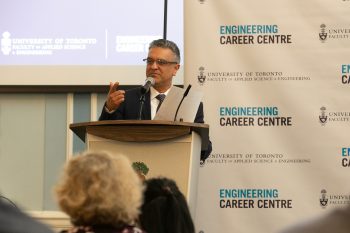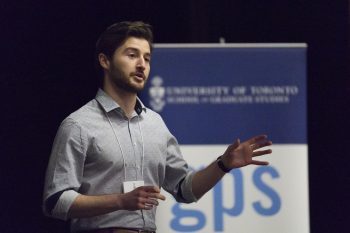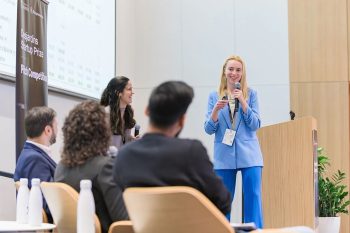What does it take to earn a gold medal at the North American iGEM (International Genetically Engineered Machine) competition? For the gold medal-winning team from U of T’s IBBME, it can be summed up in just one word: safety.
This year’s iGEM competition, hosted earlier this month at Hart House, brought 550 students from across North America to compete in one of science’s newest fields: synthetic biology. A panel of judges scored teams on three required components – scientific research, human practices, and safety – of a major, year-long research project.
The U of T team modeled its study on further understanding the ability of E. coli bacteria to form biofilms as a stress response, which allows individual bacteria to become a large, functional unit. But it was the 11-member team’s “foundational advance” component that caught the judges’ attention.
“We decided to go with a new safety standard,” said Adam Komorowski, a third-year Immunology and Molecular Genetics & Microbiology student and outgoing president of the U of T iGEM team.
It was a dimension to the project that evolved from a very personal story: this past July, Komorowski experienced the very real consequences of safety issues in his lab when he had a serious accident. Despite wearing protective safety gear and having diligently practiced safety protocols, Komorowski suffered injuries.
“That sort of shifted our attention,” Komorowski said. “We have all these protocols in place: wear this, do that. We realized that eventually the amount of rules being enforced gets in the way of actually saying, ‘I have something dangerous in my hands’.”
The group devoted a large component of their project on a new safety training package modeled on the kind of training received by lifeguards and paramedics.
“We developed situational exercises where we mock a bunch of situations that could happen in the lab,” Komorowski said.
The units involve role-playing scenarios: one team member takes on the role of the victim in a simulated safety accident while a supervisor evaluates the team’s reactions. In all, the team developed six units, which they made available through the team’s website.
Ultimately, the team was awarded a gold medal for their overall project; however, due to the way teams are scored they will not advance to the world championships.
Nevertheless, the medal was an unexpected validation for the team’s first-ever appearance at a competition. “I’m impressed at how well we did for a team with so little previous experience,” said Boris Dyakov, lab manager for the team.
Fourth-year Chemical Engineering major Michael Yu described the year-long research towards the competition as a real-life learning curve.
“When experiments give few results and progress is slow even into August, there’s nothing you can do except to dig your heels into the science and be that much more disciplined and organized.”
Since its debut at the Massachusetts Institute of Technology (MIT) just under a decade ago, iGEM has evolved into a renowned international synthetic biology competition.



